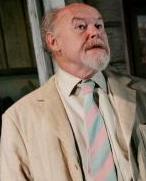SEARCH
REVIEWS
FEATURES
NEWS
Etcetera and
Short Term Listings
LISTINGS
Broadway
Off-Broadway
NYC Restaurants
BOOKS and CDs
OTHER PLACES
Berkshires
London
California
DC
Philadelphia
Elsewhere
QUOTES
On TKTS
PLAYWRIGHTS' ALBUMS
LETTERS TO EDITOR
FILM
LINKS
MISCELLANEOUS
Free Updates
Masthead
Writing for Us
A CurtainUp  London Review
London Review
 London Review
London ReviewThe Old Country
|
Poetry might be taken to indicate a certain weakening of the intellect
---- Duff |

Timothy West as Hilary
(Photo: Stephen Vaughan) |
To a regular theatregoer, the set does not convey any secrecy about the place in which this Englishman and his wife find themselves. Whilst the wooden balcony might conceivably be in the Southern United States, the proximity of the tall thin trunks of pine trees is so Chekhovian as to firmly place us behind the Iron Curtain. The piles of books indicate the place of refuge for this ex-patriot intellectual. This setting destroys the desired ambiguity of the first act where by playing Elgar and giving Hilary (Timothy West) a Garrick club tie, Bennett wants us to believe that the play might be set in England.
Unlike other plays about the Burgess, MacLean, Philby, Blunt spy scandals of the 1950s and 1960s, this play does not look at the political idealism, pacifism and the anti-Fascist movements of the 1930s which in 1933 caused the Oxford Union to vote 273 - 153 that under no circumstances would they fight for King and country. Instead of examining Hilary's reasons for defecting to, or spying for the Soviet Union, Alan Bennett gives a picture of nostalgia for England and the impression that this man has "shot himself in the foot". There is an over riding impression of English perversion, of an ironic tendency, as Bennett puts it, "there is a sense, too, that an ironic attitude towards one's country and a scepticism about one's heritage are a part of that heritage. And so, by extension, is the decision to betray it. It is irony activated.
Hilary and his wife Bron (Jean Marsh) are living in almost complete social isolation in the Russian countryside. The other players are Eric (Tim Delap) an Admiralty draughtsman who after being caught spying was allowed to leave his English prison in an exchange, and his Russian controller, the fearsomely dour and unsympathetic Olga (Rebecca Charles). Eric and Hilary have little in common intellectually. On a visit from England are Hilary's sister Veronica (Susan Tracy) and her husband Duff (Simon Williams).
Although there are many of Alan Bennett's brilliantly comic one liners, the whole play seems to lack momentum. Just why I cannot quite grasp? Maybe it is that since Perestroika the world has moved on from the days of the Cold War and that, in populist terms, Islamic states rather than Communist ones are seen as the threat to Western capitalism? Maybe it is just that irony is less stage impactive? Bennet may have caught the inertia of the Chekhovian ennui but The Other Country lacks great tragedy and great comedy.
Of the performances, Timothy West seems not cynical and nasty enough to have caused the deaths of English personnel betrayed to the Soviets. Jean Marsh is perfect as the tired wife worn out by their exile and Rebecca Charles as Olga is terrifying in her white ankle socks and her stodgy personality. Susan Tracy is excellent as the upper class, snobbish, English woman, who brings those gifts of Bath Oliver biscuits, Patum Pepperium, the latest novel from Anthony Powell, all in a Harrods carrier bag and complains about, "all this unnecessary countryside". Simon Williams as her husband is a smooth wheeler-dealer, newly knighted, he is the kind of man who effortlessly rises to the top of the any large organisation. I liked too Tim Delap's rather sad Eric.
Ultimately the loser in The Old Country is working class Eric, the young draughtsman who wants to go home, but who is not important enough to the British to form the basis of an exchange. Hilary may agree to go back to a few years in prison in England and to an England devoid of Lyon's Tea Houses but even that fate seems less a prison that his country home in Russia. I came away feeling that Hilary's exile in the dachau must have hurt so much for the lack of companionship, of conversation and wit, essential ingredients for his intellectual existence, but even then I really didn't care enough what happened to him. Maybe this was because he never told us why he did what he did?
|
THE OLD COUNTRY
Written by Alan Bennett Directed by Stephen Unwin Starring: Timothy West With: Simon Williams, Jean Marsh, Tim Delap, Susan Tracy, Rebecca Charles Set Design: John Gunter Lighting: Ben Ormerod Sound: Dan Steele Costume Design: Mark Bouman Running time: Two hours 20 minutes with one interval Box Office: 0870 060 6632 Booking to 16th May 2006 Reviewed by Lizzie Loveridge on 20th March 2006 performance at the Tragfalgar Studios, Whitehall, London, SW1 (Rail/Tube: Charing Cross) |





